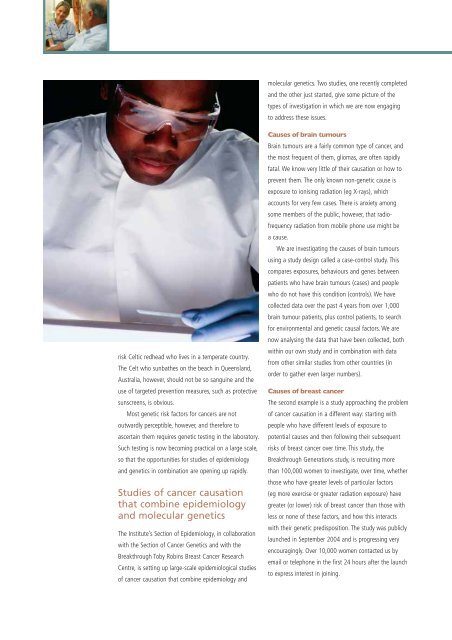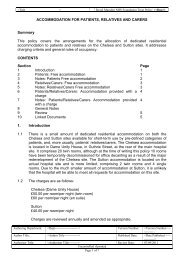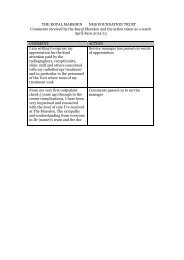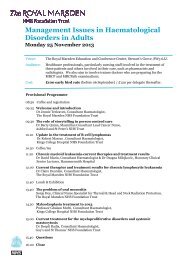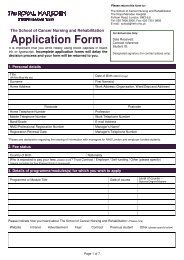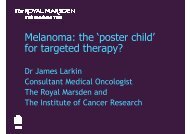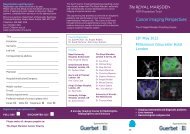Joint Annual Research Report 2004 - The Royal Marsden
Joint Annual Research Report 2004 - The Royal Marsden
Joint Annual Research Report 2004 - The Royal Marsden
You also want an ePaper? Increase the reach of your titles
YUMPU automatically turns print PDFs into web optimized ePapers that Google loves.
molecular genetics. Two studies, one recently completed<br />
and the other just started, give some picture of the<br />
types of investigation in which we are now engaging<br />
to address these issues.<br />
risk Celtic redhead who lives in a temperate country.<br />
<strong>The</strong> Celt who sunbathes on the beach in Queensland,<br />
Australia, however, should not be so sanguine and the<br />
use of targeted prevention measures, such as protective<br />
sunscreens, is obvious.<br />
Most genetic risk factors for cancers are not<br />
outwardly perceptible, however, and therefore to<br />
ascertain them requires genetic testing in the laboratory.<br />
Such testing is now becoming practical on a large scale,<br />
so that the opportunities for studies of epidemiology<br />
and genetics in combination are opening up rapidly.<br />
Studies of cancer causation<br />
that combine epidemiology<br />
and molecular genetics<br />
<strong>The</strong> Institute’s Section of Epidemiology, in collaboration<br />
with the Section of Cancer Genetics and with the<br />
Breakthrough Toby Robins Breast Cancer <strong>Research</strong><br />
Centre, is setting up large-scale epidemiological studies<br />
of cancer causation that combine epidemiology and<br />
Causes of brain tumours<br />
Brain tumours are a fairly common type of cancer, and<br />
the most frequent of them, gliomas, are often rapidly<br />
fatal. We know very little of their causation or how to<br />
prevent them. <strong>The</strong> only known non-genetic cause is<br />
exposure to ionising radiation (eg X-rays), which<br />
accounts for very few cases. <strong>The</strong>re is anxiety among<br />
some members of the public, however, that radiofrequency<br />
radiation from mobile phone use might be<br />
a cause.<br />
We are investigating the causes of brain tumours<br />
using a study design called a case-control study. This<br />
compares exposures, behaviours and genes between<br />
patients who have brain tumours (cases) and people<br />
who do not have this condition (controls). We have<br />
collected data over the past 4 years from over 1,000<br />
brain tumour patients, plus control patients, to search<br />
for environmental and genetic causal factors. We are<br />
now analysing the data that have been collected, both<br />
within our own study and in combination with data<br />
from other similar studies from other countries (in<br />
order to gather even larger numbers).<br />
Causes of breast cancer<br />
<strong>The</strong> second example is a study approaching the problem<br />
of cancer causation in a different way: starting with<br />
people who have different levels of exposure to<br />
potential causes and then following their subsequent<br />
risks of breast cancer over time. This study, the<br />
Breakthrough Generations study, is recruiting more<br />
than 100,000 women to investigate, over time, whether<br />
those who have greater levels of particular factors<br />
(eg more exercise or greater radiation exposure) have<br />
greater (or lower) risk of breast cancer than those with<br />
less or none of these factors, and how this interacts<br />
with their genetic predisposition. <strong>The</strong> study was publicly<br />
launched in September <strong>2004</strong> and is progressing very<br />
encouragingly. Over 10,000 women contacted us by<br />
email or telephone in the first 24 hours after the launch<br />
to express interest in joining.


